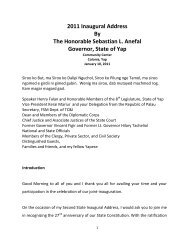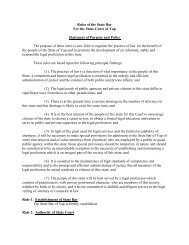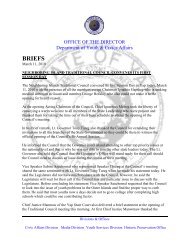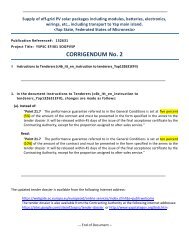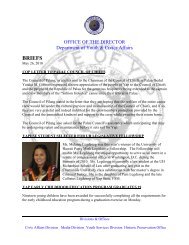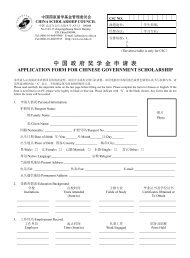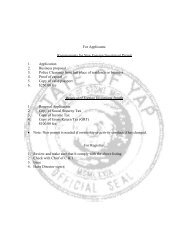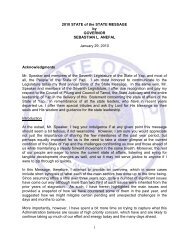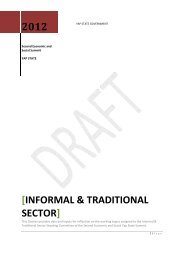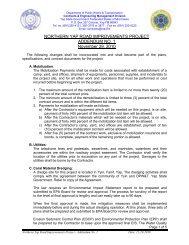RULES OF CIVIL PROCEDURE For the Trial Division of the Yap ...
RULES OF CIVIL PROCEDURE For the Trial Division of the Yap ...
RULES OF CIVIL PROCEDURE For the Trial Division of the Yap ...
You also want an ePaper? Increase the reach of your titles
YUMPU automatically turns print PDFs into web optimized ePapers that Google loves.
(d) Orders in Conduct <strong>of</strong> Actions. In <strong>the</strong> conduct <strong>of</strong> actions to which this rule<br />
applies, <strong>the</strong> court may make appropriate orders: (1) determining <strong>the</strong> course <strong>of</strong><br />
proceedings or prescribing measures to prevent undue repetition or complication in <strong>the</strong><br />
presentation <strong>of</strong> evidence or argument; (2) requiring, for <strong>the</strong> protection <strong>of</strong> <strong>the</strong> members <strong>of</strong><br />
<strong>the</strong> class or o<strong>the</strong>rwise for <strong>the</strong> fair conduct <strong>of</strong> <strong>the</strong> action, that notice be given in such<br />
manner as <strong>the</strong> court may direct to some or all <strong>of</strong> <strong>the</strong> members <strong>of</strong> any step in <strong>the</strong> action, or<br />
<strong>of</strong> <strong>the</strong> proposed extent <strong>of</strong> <strong>the</strong> judgment, or <strong>of</strong> <strong>the</strong> opportunity <strong>of</strong> members to signify<br />
whe<strong>the</strong>r <strong>the</strong>y consider <strong>the</strong> representation fair and adequate, to intervene and present<br />
claims or defenses, or o<strong>the</strong>rwise to come into <strong>the</strong> action; (3) imposing conditions on <strong>the</strong><br />
representative parties or on intervenors; (4) requiring that <strong>the</strong> pleadings be amended to<br />
eliminate <strong>the</strong>refrom allegations as to representation <strong>of</strong> absent persons, and that <strong>the</strong> action<br />
proceed accordingly; (5) dealing with similar procedural matters. The orders may be<br />
combined with an order under Rule 16, and may be altered or amended as may be<br />
desirable from time to time.<br />
(e) Dismissal or Compromise. A class action shall not be dismissed or compromised<br />
without <strong>the</strong> approval <strong>of</strong> <strong>the</strong> court, and notice <strong>of</strong> <strong>the</strong> proposed dismissal or compromise<br />
shall be given to all members <strong>of</strong> <strong>the</strong> class in such manner as <strong>the</strong> court directs.<br />
Rule 23.1. Derivative Actions by Shareholders. In a derivative action brought by one<br />
or more shareholders or members to enforce a right <strong>of</strong> a corporation or <strong>of</strong> an<br />
unincorporated association, <strong>the</strong> corporation or association having failed to enforce a right<br />
which may properly be asserted by it, <strong>the</strong> complaint shall be verified and shall allege (1)<br />
that <strong>the</strong> plaintiff was a shareholder or member at <strong>the</strong> time <strong>of</strong> <strong>the</strong> transaction <strong>of</strong> which he<br />
complains or that his share or membership <strong>the</strong>reafter devolved on him by operation <strong>of</strong><br />
law, and (2) that <strong>the</strong> action is not a collusive one to confer jurisdiction on a court <strong>of</strong> <strong>the</strong><br />
State <strong>of</strong> <strong>Yap</strong> which it would not o<strong>the</strong>rwise have. The complaint shall also allege with<br />
particularity <strong>the</strong> efforts, if any, made by <strong>the</strong> plaintiff to obtain <strong>the</strong> action he desires from<br />
<strong>the</strong> directors or comparable authority and, if necessary, from <strong>the</strong> shareholders or<br />
members, and <strong>the</strong> reasons for his failure to obtain <strong>the</strong> action or for not making <strong>the</strong> effort.<br />
The derivative action may not be maintained if it appears that <strong>the</strong> plaintiff does not fairly<br />
and adequately represent <strong>the</strong> interests <strong>of</strong> <strong>the</strong> shareholders or members similarly situated<br />
in enforcing <strong>the</strong> right <strong>of</strong> <strong>the</strong> corporation or association. The action shall not be dismissed<br />
or compromised without <strong>the</strong> approval <strong>of</strong> <strong>the</strong> court, and notice <strong>of</strong> <strong>the</strong> proposed dismissal<br />
or compromise shall be given to shareholders or members in such manner as <strong>the</strong> court<br />
directs.<br />
Rule 23.2. Actions Relating to Unincorporated Associations. An action brought by<br />
or against <strong>the</strong> members <strong>of</strong> an unincorporated association as a class by naming certain<br />
members as representative parties may be maintained only if it appears that <strong>the</strong><br />
representative parties will fairly and adequately protect <strong>the</strong> interests <strong>of</strong> <strong>the</strong> association<br />
and its members. In <strong>the</strong> conduct <strong>of</strong> <strong>the</strong> action <strong>the</strong> court may make appropriate orders<br />
corresponding with those described in Rule 23(d), and <strong>the</strong> procedure for dismissal or<br />
compromise <strong>of</strong> <strong>the</strong> action shall correspond with that provided in Rule 23(e).<br />
Rule 24. Intervention.



